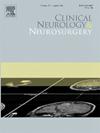谷氨酸脱羧酶65相关神经系统综合征的临床特点及预后分析:一项来自西南地区的回顾性研究
IF 1.6
4区 医学
Q3 CLINICAL NEUROLOGY
引用次数: 0
摘要
目的探讨谷氨酸脱羧酶-65 (GAD65)相关神经系统综合征的临床特点、免疫治疗反应和长期预后,并确定与不良预后相关的潜在因素。方法对2019年8月至2024年3月在华西医院诊断为抗gad65相关神经综合征的患者进行回顾性队列研究。系统分析患者的临床特点、实验室及影像学表现、免疫治疗反应及预后。结果共纳入37例患者。主要临床表型包括癫痫(Ep) (32.4 n = 12日 %),stiff-person谱系障碍(SPSD) (n = 8,21.6 %),边缘脑炎(LE) (18.9 n = 7日 %)、小脑性共济失调(CA) (8.1 n = 3, %)。其中女性26例(70.3 %),中位发病年龄39岁(IQR 30;9 - 65)范围。10例(27.0 %)伴有全身自身免疫性疾病,15例(40.0 %)自身抗体阳性。11例患者有焦虑症(29.7 %)。35例患者(94.6 %)接受免疫治疗,30例患者症状缓解。随访数据中位持续时间为16个月(IQR 31.0;范围12.0-67.0)、焦虑症、脑脊液(CSF)蛋白升高、延迟治疗和疾病复发与不良预后相关。结论与GAD65抗体相关的神经系统综合征具有明显的临床异质性。尽管大多数患者对免疫治疗有反应,但早期干预对改善结果至关重要。焦虑障碍、脑脊液蛋白升高、治疗延迟和疾病复发与不良预后相关。本文章由计算机程序翻译,如有差异,请以英文原文为准。
Clinical characteristics and prognostic analysis of glutamic acid decarboxylase 65-associated neurological syndromes: A retrospective study from Southwest China
Objective
To investigate the clinical characteristics, immunotherapeutic responses, and long-term outcomes of glutamic acid decarboxylase-65 (GAD65)-associated neurological syndromes, and to identify potential factors linked to poor outcomes.
Methods
We conducted a retrospective cohort study of patients diagnosed with anti-GAD65-associated neurological syndromes at West China Hospital from August 2019 to March 2024. The clinical characteristics, laboratory and imaging findings, response to immunotherapy and prognosis of the patients were systematically analyzed.
Results
37 patients were included in this study. Predominant clinical phenotypes included epilepsy (Ep) (n = 12, 32.4 %), stiff-person spectrum disorder (SPSD) (n = 8, 21.6 %), limbic encephalitis (LE) (n = 7, 18.9 %), cerebellar ataxia (CA) (n = 3, 8.1 %). Among them, 26 (70.3 %) were female, with a median age of onset at 39 years (IQR 30; range 9–65). Concomitant systemic autoimmune diseases were observed in 10 patients (27.0 %), 15 (40.0 %) were positive for coexisting autoantibodies. Anxiety disorders were documented in 11 patients (29.7 %). 35 patients (94.6 %) received immunotherapy, with symptom remission observed in 30 patients. The follow-up data over a median duration of 16 months (IQR 31.0; range 12.0–67.0), anxiety disorders, elevated cerebrospinal fluid (CSF) protein, delayed treatment and disease relapse are associated with poor outcomes.
Conclusions
Neurological syndromes related to GAD65 antibodies exhibited marked clinical heterogeneity. Although most patients responded to immunotherapy, early intervention was critical for improving outcomes. Anxiety disorders, elevated CSF protein, treatment delay, and disease relapse were associated with adverse prognosis.
求助全文
通过发布文献求助,成功后即可免费获取论文全文。
去求助
来源期刊

Clinical Neurology and Neurosurgery
医学-临床神经学
CiteScore
3.70
自引率
5.30%
发文量
358
审稿时长
46 days
期刊介绍:
Clinical Neurology and Neurosurgery is devoted to publishing papers and reports on the clinical aspects of neurology and neurosurgery. It is an international forum for papers of high scientific standard that are of interest to Neurologists and Neurosurgeons world-wide.
 求助内容:
求助内容: 应助结果提醒方式:
应助结果提醒方式:


